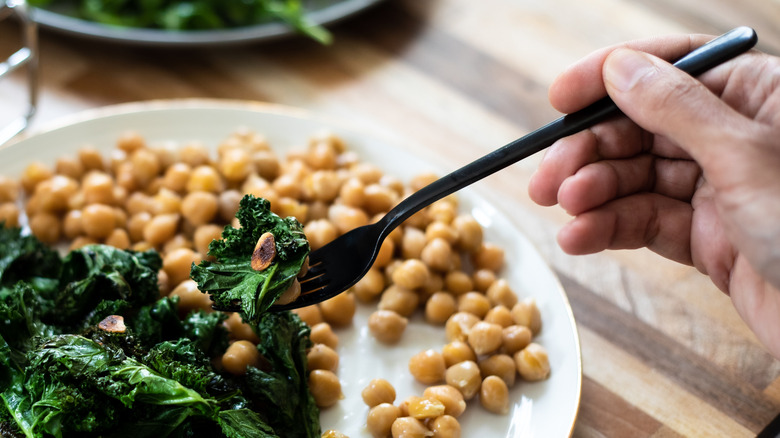A Popular Legume That Can Help Lower Cholesterol Has More Protein Than An Egg
Vegetarians and vegans know there's more to plant-based protein than just veggie patties and meat substitutes. Legumes are a delicious and versatile option that can easily take center stage in your meals. From tacos to homemade bean burgers (even breakfast bowls!), these fiber- and protein-packed powerhouses can fit in just about anywhere.
Take chickpeas, for example. They've earned their popularity thanks to their mild flavor and ability to blend seamlessly into both savory dishes and even sweets. If you've tried the chickpea cookie dough dip, you already know how well they can indulge a sweet tooth. But chickpeas aren't just tasty. Chickpeas have plenty of protein to satisfy your appetite. Just half a cup of cooked chickpeas packs over 7 grams of protein, edging out the 6 grams you'd get from a large egg.
And while you're swapping out meat, you're also scoring an added health bonus: fiber. Meat lovers can't say their protein sources have 6 grams of fiber like chickpeas. Why is that fiber important? Chickpeas are a great source of soluble fiber that can help lower your cholesterol.
The fiber in chickpeas may slightly reduce cholesterol
While age, smoking, certain medications or health conditions, and a lack of physical activity can all cause your cholesterol levels to creep up, your diet plays a big role too. Foods high in saturated and trans fats can send more cholesterol coursing through your arteries. That's not something you need to worry about with chickpeas because there's only a tiny trace of saturated fat in half a cup.
Adding chickpeas or chickpea flour to your meals might even help lower your cholesterol. A 2007 study in the Annals of Nutrition and Metabolism found that people who supplemented their diets with chickpeas saw a noticeable drop in cholesterol levels. Participants followed either a chickpea-rich diet or a wheat-based one for five weeks, then switched to the other for another five weeks. The chickpea diet included 140 grams of canned chickpeas (just under a cup), along with chickpea bread and chickpea shortbread, which added up to 27 grams of fiber a day. Compared to the wheat diet, the chickpea-based one reduced total cholesterol by almost 3.9% and LDL (the "bad") cholesterol by 4.6%.
Other benefits of chickpeas
Chickpeas offer more than just protein and fiber. They're also a good source of iron, folate, and health-boosting plant compounds. According to a 2023 review in Frontiers in Nutrition, natural compounds in chickpeas may help reduce inflammation, which is often linked to chronic diseases. One particular peptide found in chickpeas has even shown potential for fighting cancer by interacting with a protein involved in tumor growth. Other peptides may help manage blood pressure by blocking the ACE enzyme, which is responsible for tightening blood vessels. Thanks to their low sugar content and high levels of protein and fiber, chickpeas also help keep your blood sugar stable, which means you won't experience sudden spikes after eating them.
You might have heard that chickpeas aren't a "complete" protein like those from animal sources. While chickpeas do contain all nine essential amino acids your body needs, they have half the methionine of an egg. To round out your amino acid intake, consider pairing chickpeas with methionine-rich foods like oats, quinoa, teff, or buckwheat.


